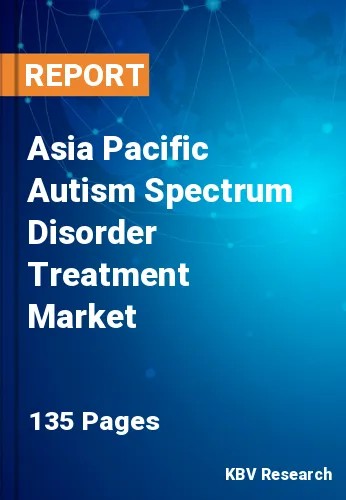The Asia Pacific Autism Spectrum Disorder Treatment Market would witness market growth of 7.3% CAGR during the forecast period (2023-2030).
Autism spectrum disorder is a neurodevelopmental disorder that affects social interaction, communication, and behavior. It is characterized by a wide range of symptoms and severity, which is why it is called a "spectrum" disorder. ASD (autism spectrum disorder) is typically diagnosed through a comprehensive evaluation by healthcare professionals, including psychologists, speech therapists, and developmental pediatricians. The diagnosis is based on observed behaviors and developmental history.
Early intervention services are crucial for children with ASD. These services often involve therapies such as speech therapy, applied behavior analysis (ABA), and occupational therapy. Early intervention is associated with significantly improving outcomes for children with ASD. It is a lifelong condition, but with appropriate support and intervention, individuals with ASD can progress and lead fulfilling lives. The level of support needed varies widely among individuals. ASD is a collective term for several neurodevelopmental conditions or impairments. It is a polygenic and heritable condition. The early years of childhood are when the autism spectrum condition commonly manifests.
According to the National Library of Medicine's 'Prevalence of autism spectrum disorder in Asia’ report, males had a greater overall prevalence of ASD (0.45%) than females (0.18%). The prevalence of ASD was 0.51%, 0.31%, and 0.35% correspondingly in East Asia, South Asia, and West Asia. As a result, it can be said that ASD is becoming more common in Asia. Researchers, clinicians, and organizations across the region are working to improve the understanding of autism, develop culturally sensitive interventions, and enhance support services for individuals with ASD and their families. Collaboration within the region and with international partners is a crucial feature of many of these initiatives. Thus, the region presents lucrative growth prospects for the market.
The China market dominated the Asia Pacific Autism Spectrum Disorder Treatment Market, by Country in 2022, and would continue to be a dominant market till 2030; thereby, achieving a market value of $201.5 Million by 2030. The Japan market is estimated to grow at a CAGR of 6.6% during (2023 - 2030). Additionally, The India market would showcase a CAGR of 8% during (2023 - 2030).
Based on Type, the market is segmented into Stimulants, Antipsychotic Drugs, Selective Serotonin Reuptake Inhibitors, Sleep Medications, and Others. Based on Application, the market is segmented into Autistic Disorder, Asperger Syndrome, Pervasive, Developmental Disorder, and Others. Based on Distribution Channel, the market is segmented into Retail Pharmacy, Hospital Pharmacy and Online Pharmacy. Based on countries, the market is segmented into China, Japan, India, South Korea, Singapore, Malaysia, and Rest of Asia Pacific.
Free Valuable Insights: The Worldwide Autism Spectrum Disorder Treatment Market is Projected to reach USD 3 Billion by 2030, at a CAGR of 6.2%
The market research report covers the analysis of key stake holders of the market. Key companies profiled in the report include F. Hoffmann-La Roche Ltd., Bristol Myers Squibb Company, Merck & Co., Inc., Novartis AG, Eli Lilly And Company, Pfizer Inc., Johnson & Johnson, Otsuka Pharmaceutical Co., Ltd., Yamo Pharmaceuticals, and Curemark LLC.
By Type
By Application
By Distribution Channel
By Country
Our team of dedicated experts can provide you with attractive expansion opportunities for your business.

